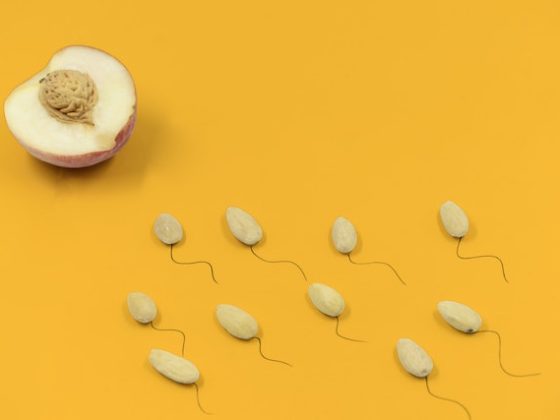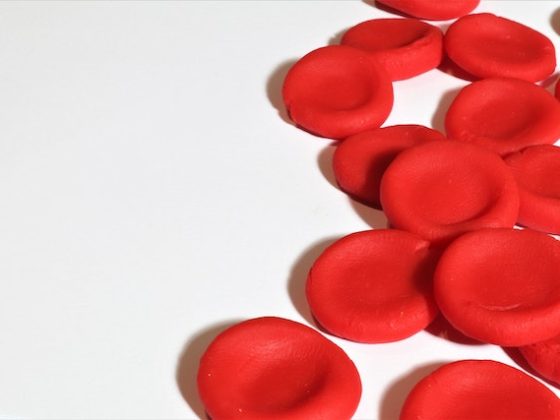Hey there! This post may contain affiliate links. As an Amazon Associate, I earn a teensy commission from qualifying purchases when you buy through these links (at no additional cost to you). For more info, please check the full disclaimer.
Yeast infection during pregnancy is a painful condition affecting many soon-to-be-moms. With almost 10% of US women at risk, it’s important to know about the causes, symptoms, and treatments for vaginal thrush during pregnancy.
When you’re pregnant, your body has low immunity. This is owed to major hormonal changes in pregnancy, making you more susceptible to catching infections. High estrogen can wreck the internal balance and puts you at the target of fungal infections.
If the symptoms aren’t treated properly on time, they can affect your baby’s health.
In this guide, you’ll get to know everything about yeast infection in pregnancy, its effects, and tips for moms-to-be to prevent and treat candidiasis.
What is a Yeast Infection?
Yeast infections are also known as vaginal thrush, vulvovaginal candidiasis (VVC), or yeast vaginitis. This painful infection is caused by Candida albicans — a white yeast-like fungus found in the digestive tract and mouth.
Almost 20% of the women get vaginal thrush at least once in their lifetime. During pregnancy, the risk rises to 30%!
Research also shows that women who are pregnant have more cases of candidiasis compared to non-pregnant women. Scientists believe it’s because of the major hormonal fluctuations in the vaginal flora.
Another study suggests that pregnancy fungal infections are usually higher in illiterate women belonging to lower economic regions. They’re less aware of the risks and how to prevent them.
The worst thing about a yeast infection during pregnancy is its sudden recurrence and discomfort.
Signs of candidiasis in early pregnancy often include inflammation, irritation, and white discharge.
When Does Vaginal Thrush Occur During Pregnancy?
The early months of pregnancy are the perfect time for yeast overgrowth.
This is the time when your body has a whole plethora of major changes such as pH imbalance, hormone imbalance, and even a high risk of gestational diabetes.
Most women experience a yeast infection during pregnancy in the second trimester. Some women might even notice vaginal fungal infection symptoms in their third trimester.
So you have to take extra precautions to avoid candidiasis during the early and mid-pregnancy months.
Read More: 7 Alarming Symptoms of Gestational Diabetes
What Causes Yeast Infection During Pregnancy?
The two key pregnancy hormones, estrogen, and progesterone are higher than usual while pregnant. These elevated levels alter the internal environment of your body. As a result, you might experience a vaginal pH imbalance.
Your Lady V has a particular amount of good bacteria that helps in cleansing the region and keeps it in top form. But because of the pH fluctuation, there’s often a spike in yeast growth.
Besides, if you have diabetes or are prediabetic, it can further put you at risk of yeast infection while pregnant. High blood sugar can wreck the vaginal bacterial growth, creating a favorable environment for fungal overgrowth.
Candidiasis isn’t technically a sexually transmitted infection because it’s possible to get it without intercourse. But it’s still contagious.
In addition, excess moisture in the vagina can also allow the yeast to grow uncontrollably and cause an infection.
For example, douching or scented soaps can cause yeast infection during pregnancy. They do more harm to vaginal hygiene than good.
Also, if you take unprescribed antibiotics or hormonal control pills, you might be at the target of pregnancy yeast infections.
Read More: 14 Shocking Symptoms of Early Diabetes in Women
Does Fungal Infection In Pregnancy Hurt Your Baby?
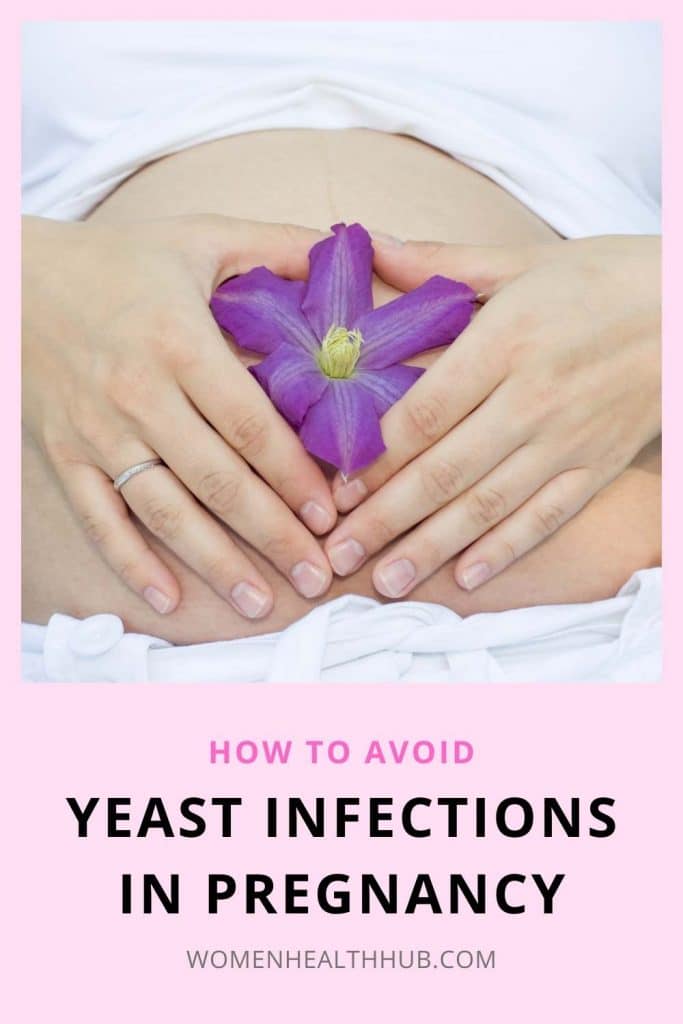
Luckily, there are no lasting harmful effects of pregnancy candidiasis on you and your baby.
But on the downside, they could be extremely irritating, painful, and uncomfortable for you.
If you leave a yeast infection in pregnancy untreated, it will pass on to your baby during delivery. Consequently, your little one could have oral thrush or white patches on the skin.
Once you start breastfeeding, the fungal infection transfers via the baby’s mouth to your breasts.
This is why you must treat a yeast infection during pregnancy right away to curb its spread.
How Can Yeast Infection Affect Pregnancy?
Now the main question is: can yeast infection affect your pregnancy?
Candidiasis in early pregnancy doesn’t harm your health. You’re capable of having a safe birth, with no impact on your little one’s development. There are also no serious risks of preterm delivery, low newborn weight, or miscarriages.
During pregnancy, moms-to-be have lots of vaginal discharge, preventing the fungal infection from reaching the womb.
The only thing you need to be prepared for is significant discomfort because of the candidiasis symptoms.
Can Yeast Infection Prevent Pregnancy?
This is also a major concern soon-to-be-moms have about yeast infection during pregnancy.
Having a fungal vaginal infection won’t affect your fertility, but conceiving a baby could be a problem.
If you already have vaginal thrush, your immune system will keep fighting against the fungal overgrowth. In the process, it may accidentally kill your partner’s sperm.
Thus, it could make getting pregnant a lot more challenging. So if you notice any serious yeast infection signs, treat them before you attempt conceiving.
Read More: 15 Safest Herbal Teas to Boost Fertility Naturally & Get Pregnant in Weeks
What Does Yeast Infection During Pregnancy Look Like?
Pregnancy candidiasis symptoms often vary, depending on the severity of the infection.
However, most vaginal fungal infections in pregnancy are mild yet uncomfortable.
Here are a few signs of yeast infection that you should expect while pregnant:
- Itching, irritation, and vaginal swelling
- Redness in surrounding tissues, thighs, and groin
- Vaginal soreness
- Burning sensation while peeing
- Vaginal discharge that looks like cottage cheese
- Watery or thick discharge consistency
- Odorless secretion
If you experience any two or more of the symptoms of pregnancy vaginal thrush, book an appointment with your ob-gyn right away and get treatment.
How to Diagnose Yeast Infection in Pregnancy?
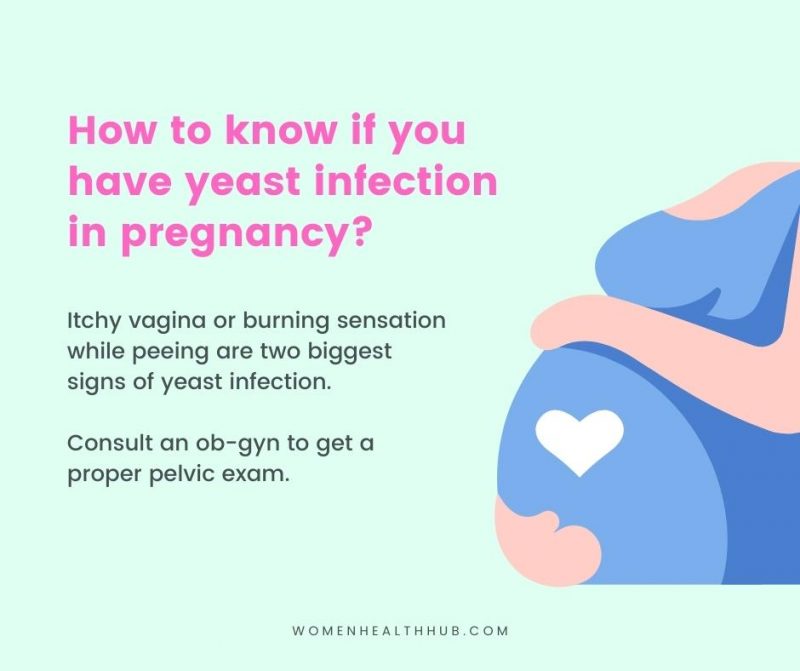
The biggest indicator of yeast infection during pregnancy is the symptoms. An itchy vagina or a burning sensation while peeing could be a sign of a fungal infection.
However, without a proper test, there’s always uncertainty. It’s necessary to go for a lab test or consult a doctor if you want to be 100% sure about the diagnosis.
A gynecologist or GP would do a physical exam of your pelvis and genital region. They may ask you questions about your sexual history and take a look at the vaginal discharge.
For confirmation, the doctors would then take a sample of your vaginal discharge using a cotton swab and send it to a lab for testing. After observing under a microscope, they’ll know for sure whether or not it’s candidiasis.
Yeast Infection vs. Pregnancy Discharge: What’s The Difference?
You might notice a vaginal discharge in the early stages and it’s completely normal. So how would you recognize the yeast infection vs. pregnancy discharge?
Here are a few differences and similarities you should know:
| Pregnancy Discharge | Yeast Infection Discharge |
| Has a mild smell | Has no smell |
| Could be milky, white, or pale yellow | Is white |
| Has no lumps | Looks lumpy |
| Has thin, watery consistency | Has thick consistency |
| Resembles mucus | Resembles cottage cheese |
The easiest way to tell apart pregnancy discharge vs. yeast infection discharge is by looking at its appearance. Fungal fluid is thick, lumpy, and odorless while the other is thin and watery.
Why Do You Keep Getting Yeast Infections In Pregnancy?
Yeast infection during pregnancy is not a one-time attack and could recur again, even after the first trimester. This phenomenon is known as recurrent vulvovaginal candidiasis.
The main reason behind recurrence is when the initial attack isn’t cured properly. If you want to prevent another fungal infection during pregnancy, your best bet is to completely stop the yeast overgrowth before it transfers to your little one.
Read More: 25 Awesome Foods for Pregnancy Heartburn Relief
Can Yeast Infection Cause Miscarriages?
Vaginal thrush itself doesn’t cause a miscarriage but many factors can lead to it.
For example, taking an antifungal drug on your own raises the chances of miscarriage.
#Facts
A 2019 Canadian study exposes the harmful effects of consuming an unusually high dose of oral fluconazole on childbirth. According to the research, this drug doubles the risk of miscarriage when taken to treat yeast infection during pregnancy.
A similar Danish study found that taking low-dose fluconazole is also risky for moms-to-be.
This is why antifungal drugs should be prescribed with more caution to pregnant women. It’s better to consult a pro before you take any meds to treat the pregnancy fungal infections.
How To Treat a Yeast Infection In Pregnancy?
Pregnancy candidiasis may not directly affect your health, but it can pass on to your baby during delivery. This makes it slightly more dangerous and critical enough to be treated on time.
Besides the obvious modern medication, you can also try various traditional natural remedies to treat pregnancy yeast infections for good.
Let’s go through some popular methods to treat a yeast infection during pregnancy.
1. Over-the-counter medications:
Many over-the-counter medicines effectively treat yeast infection in pregnancy. Some OTC vaginal creams and suppositories are perfectly safe to take while pregnant to cure fungal growth.
A few oral drugs lead to complications and aren’t recommended for treating a yeast infection during pregnancy.
It’s also important to note that candidiasis can reoccur at any time and no one cure can permanently resolve the problem.
2. Natural Remedies:
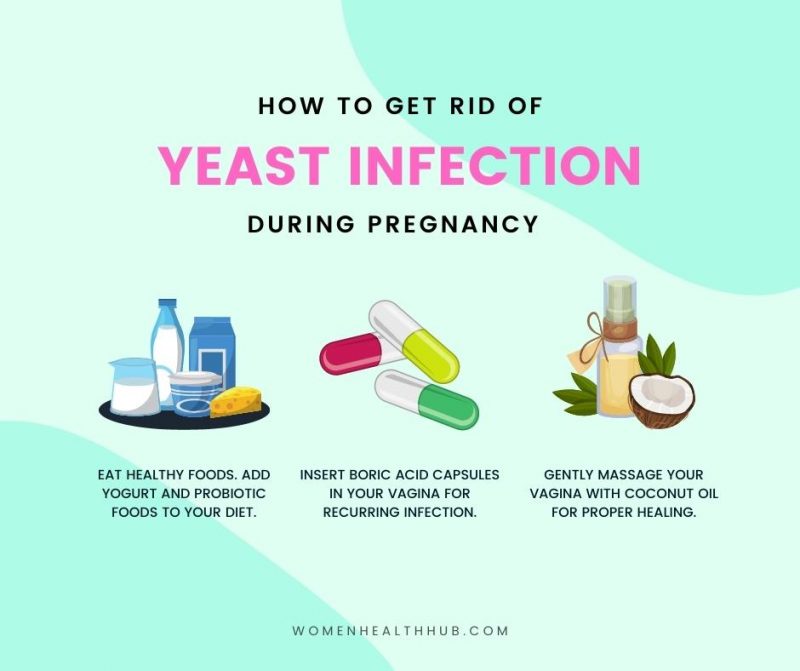
If you’re tired of recurring symptoms of yeast infection during pregnancy, your best bet is trying out different safe natural remedies to cure fungal growth.
Besides eating nutritious anti-yeast foods, you can try a few safe essential oil massages to soothe the irritation.
Here are some proven home remedies to treat vaginal thrush naturally in pregnancy without risking your baby’s health:
- Boric acid:
Apart from being an excellent cure for bacterial vaginosis, boric acid capsules are also an effective treatment for yeast infection while pregnant. Boric acid has antifungal properties that can stop recurrent vaginal fungal infections.
- Yogurt:
Natural yogurt contains probiotics or good bacteria that can help regain your vaginal flora balance. It’s one of the most effective home remedies to treat candidiasis during pregnancy.
While many women find relief by eating yogurt, some prefer inserting it inside the vagina to get relief.
- Coconut oil:
Not all oils are safe to use when you’re pregnant. Unlike tea tree oil which can be harmful to pregnant women with a yeast infection, coconut oil is a much safer option.
Experts agree that a few drops of concentrated coconut oil can help you get rid of vaginal candidiasis for good. You can soak a tampon in coconut oil and insert it into the vagina.
But it’s important to keep changing the tampon to prevent any further complications.
Read More: 11 Best Home Remedies to Get Rid of Bacterial Vaginosis Naturally
How Long Does it Take to Cure a Yeast Infection?
It may take about three to seven days for the medicines to cure the yeast infection during pregnancy.
The treatment speed also depends on whether you have a mild or severe infection.
Moderate fungal symptoms are easier to treat and take just a few days to heal. The more severe ones could even take more than a week.
#FACTS
Can Vaginal Thrush In Pregnancy Go Away On Its Own?
Yes, it’s possible for a yeast infection during pregnancy to go away on its own.
Mostly, fungal infections take about a week to fully heal and normalize the vaginal discharge. This also depends on your body’s ability to regain the pH balance, hormone balance, and reduce the blood sugar spikes.
Although, we recommend taking prescribed meds or following proven home remedies for treating pregnancy yeast infection as soon as you can.
Waiting will not only worsen the symptoms but could be seriously uncomfortable for you.
How Can You Prevent Yeast Infections In Pregnancy?
So the main question now is: what can you do to prevent vaginal thrush during pregnancy?
Here are some effective tips to avoid getting a fungal infection in pregnancy:
- Wear breathable cotton panties in summers
- Avoid douching as it can wreck the pH balance in the vagina
- Ensure washing vagina thoroughly with water after peeing
- Avoid wearing skin-tight pants
- Don’t wear wet clothes for a long time after swimming
- Avoid using scented products such as toilet papers, soaps, or gels
- Control your blood sugar levels (especially if you’re a diabetic)
- Eat lots of yogurt or other probiotic foods.
I hope this article answers many of your doubts about yeast infection during pregnancy and its effect on your baby’s health.
Take precautions, practice proper vaginal hygiene, and avoid eating any foods that could aggravate fungal infections. Only take prescribed meds by professionals. Get your Lady V checked often to ensure there are no candidiasis symptoms.
References:
- https://systematicreviewsjournal.biomedcentral.com/articles/10.1186/s13643-015-0018-2
- https://www.gynaecologyjournal.com/articles/30/2-1-9-522.pdf
- https://nouvelles.umontreal.ca/en/article/2019/02/19/pregnant-women-should-be-careful-taking-anti-fungal-pills/
- https://www.uspharmacist.com/article/flucanozole-linked-to-higher-rates-of-miscarriage-when-used-during-pregnancy
- https://dermnetnz.org/topics/vulvovaginal-candidiasis/






